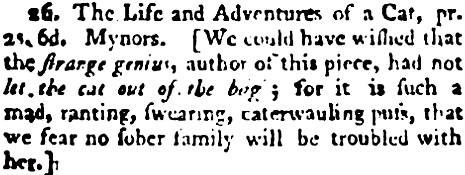The phrase to let the cat out of the bag means to disclose a secret.
Although it is possible that to let the cat out of the bag originally referred to some specific allusion, such as a line in a play, that has now been lost, it is probable that this phrase is simply based on the comparison between the surprise caused by a secret that has suddenly been revealed and the commotion created by a frightened cat released from a bag. An additional image might have been that, once disclosed, a confidence spreads just like, once let out, a cat is free to go wherever it wants.
The phrase is first recorded in the review of a newly-published book in The London Magazine: or, Gentleman’s Monthly Intelligencer of April 1760:

The Life and Adventures of a Cat, pr. 2s. 6d. Mynors. [We could have wished that the strange genius, author of this piece, had not let the cat out of the bag; for it is such a mad, ranting, swearing, caterwauling puss, that we fear no sober family will be troubled with her.]
The fact that the reviewer punned on the phrase shows that it was already well established.
Thomas Mortimer (1730-1810), an English writer on economics, also used the expression in Every Man his Own Broker: or, A Guide to Exchange-Alley (1761):
Term generally begins a few days before the drawing of the lottery, when those who have contracted to take, or are already possessed of, more tickets than they can possibly hold, in the language of ’Change-Alley, begin to open the budget¹, or to let the cat out of the bag; and these may be not improperly stiled, the bulls² plaintiffs; and the opposite party, who have agreed to deliver a quantity of tickets without being possessed of them, the bears² defendants.
¹ In to open the budget, budget, which originally designated a pouch, bag, wallet, usually of leather, has the figurative sense of news, and the phrase means to reveal the news.
² In stock exchange, bulls and bears are the two different classes of speculators. A bull is someone who endeavours by speculative purchases, or otherwise, to raise the price of stocks. A bear is a speculator for a fall, i.e. one who sells stock for delivery at a future date, in the expectation that meanwhile prices will fall, and he will be able to buy in at a lower rate what he has contracted to deliver at a higher. A bear was formerly called a bearskin jobber, which makes it probable that the original phrase was to sell the bearskin, and that it originated in the proverb to sell the bear’s skin before one has caught the bear.
The following is from The Gentleman-Cit. (1762), a free translation by the British dramatist and actor Samuel Foote (1720-77) or one of his collaborators of Le Bourgeois Gentilhomme (1670), by the French dramatist and actor Molière (Jean-Baptiste Poquelin – 1622-73):
– Madam Jordan: And pray what does this same nobleman do for you?
– Monsieur Jordan: Why, things that would surprize you, if you knew them all.
– Madam Jordan: And what are they?
– Monsieur Jordan: No, hold there, wife; I shall not let the cat out of the bag, neither.
FOLK ETYMOLOGY
A popular but erroneous theory, of which many variants exist, establishes a connection between to let the cat out of the bag and to buy a pig in a poke.
According to this theory, a dishonest farmer, claiming to be selling a young pig, might substitute a cat in a tied bag. A circumspect buyer would examine the purchase on the spot; an unwary one would not do so until it was too late. Either way, the cat would then be out of the bag and the truth would be known.
This theory makes little sense, because a live cat in a bag can hardly be mistaken for a piglet.
Additionally, the metaphor a pig in a poke, which is first recorded around 1275, about five centuries before the phrase to let the cat out of the bag, has only been associated with the latter within the context of this erroneous theory.
The existence, prior to that of to let the cat out of the bag, of the English and French phrases to buy a cat in the sack and acheter/vendre chat en poche (to buy/sell cat in poke) is not a counterargument, as the latter phrases have never appeared in contrast to the metaphor conveyed by the former. As for the French phrase acheter le chat pour le lièvre (to buy the cat for the hare), it refers to a dead cat substituted for a dead hare in a hunter’s game bag.
I have exposed several other folk etymologies, in particular in the following articles:
– origin of ‘Indian summer’ and French ‘été sauvage’
– The usual explanation of ‘Hobson’s choice’ is fallacious.
– the authentic origin of ‘to rain cats and dogs’
– origin of ‘once in a blue moon’
– Kilkenny cats
– the authentic origin of ‘a pretty kettle of fish’
– origin of ‘to buttonhole’ (to detain in conversation)
– origin of ‘point-blank’
– between the devil and the deep blue sea
– meaning and origin of ‘the devil to pay’
– origin of ‘to turn a blind eye’.
